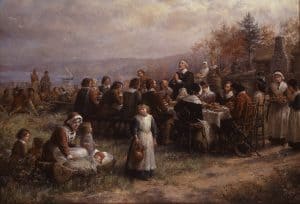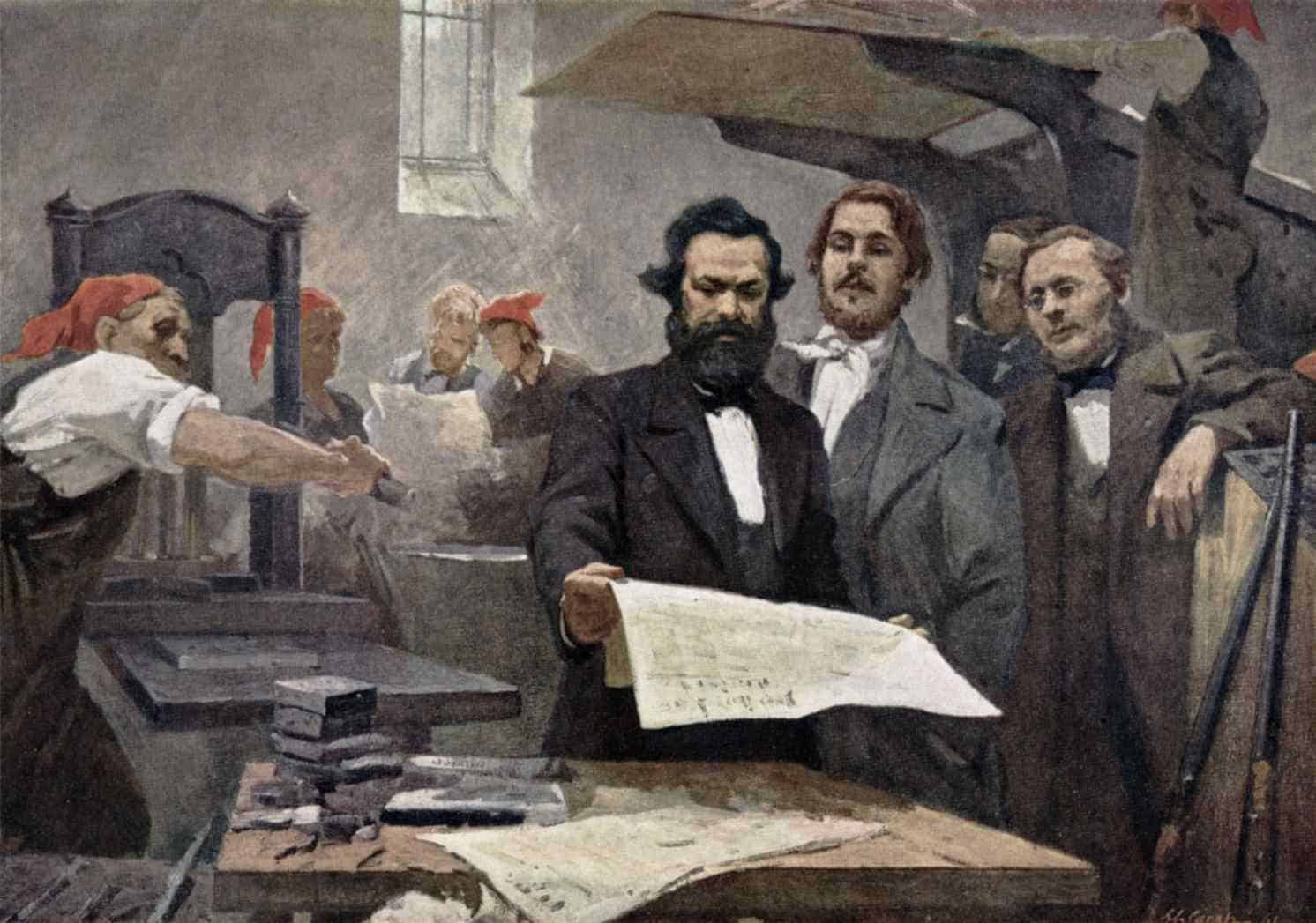Adapted from “A Look Back at Jamestown Shows Why the Social Justice Movement and Socialism, Despite All Their Appeals to Justice, Are Inherently Unjust,” available here and at
https://wordfoundations.com/jamestown/
The article showcased on this page is available as a printable PDF file here.
Learn more about Jamestown here.
Recently at Word Foundations, I posted a 100-word paragraph against socialism. A PDF of this slide is available here.
In the early 1600s, settlers at both Jamestown and Plymouth initially sought to produce food and wealth according to a communal system. Workers contributed the fruits of their labors to a “common store” on which all relied. This approach pushed both settlements to the brink of starvation. The people knew they would starve if they continued operating this way, so they assigned land directly to individuals and families, who then could reap the benefits of their own work. After this change, both communities prospered. History proves socialism leads to bondage and misery, and that free enterprise promotes freedom and prosperity.
Did you know that in North America even before Karl Marx, two specific attempts at communal arrangements for production and allocation of goods and services failed completely? They occurred a decade apart and several hundred miles apart — with amazingly similar results. Before the disastrous scenario unfolded at Plymouth, it occurred at Jamestown.
Access the articles provided to learn details about both failed experiments. You can link to the articles from the pictures as well as from the names of the settlements.

In the remainder of this brief post, we’ll talk generally about why these experiments were destined to fail, and why socialism fails every time it is tried.

On page 55 of his book, How Capitalism Saved America, The Untold History of Our Country, from the Pilgrims to the Present,1 Thomas J. DiLorenzo cites two experts in the history of economics — Gary Walton and Hugh Rockoff. Walton and Rockoff illustrate in simple terms what happened in Jamestown — and what essentially happens everywhere workers are put under a socialist economic system and instructed to contribute to a community store through their labors and to draw from that same store to address their needs. Here’s a summary of the scenario Walton and Rockoff present.
 Ten workers collectively “own” land (actually, the government owns it) on which they are to produce 100 bushels of wheat. Thus, each worker will, according to the plan, have 10 bushels to consume once the wheat is harvested. One worker, however, begins to slack off. His slothfulness, the willful neglect of his duty, his napping, or any other distraction causing him to work less than everyone else — any of these or a combination of two or more — result in a reduction of his work contribution and output by 50 percent. If everyone else performs as planned (this is highly unlikely to happen) but this one worker does not, the collective output of wheat will be 95 bushels as opposed to 100.
Ten workers collectively “own” land (actually, the government owns it) on which they are to produce 100 bushels of wheat. Thus, each worker will, according to the plan, have 10 bushels to consume once the wheat is harvested. One worker, however, begins to slack off. His slothfulness, the willful neglect of his duty, his napping, or any other distraction causing him to work less than everyone else — any of these or a combination of two or more — result in a reduction of his work contribution and output by 50 percent. If everyone else performs as planned (this is highly unlikely to happen) but this one worker does not, the collective output of wheat will be 95 bushels as opposed to 100.
The other nine workers are not stupid. They understand they’ll receive 9.5 bushels of wheat at the end of the harvesting season, even though they worked as much as called for by the original plan — one that said they would receive 10 full bushels. The nine also realize that that the worker who shirked his duty labored only half as much as everyone else.
Do you see what has happened? One worker performs 50 percent of his expected work load, and everyone gets 5 percent less than the plan originally called for. While it’s true the shirker gets a half bushel less than the plan originally stipulated, he gets 4.5 bushels for which he did not work.
Soon, realizing that the communal arrangement may also afford them the opportunity to get more by working less, all the other workers will reduce their efforts, and more than likely, reduce them substantially. Soon the planned output of 100 bushels becomes a real output of next to none!2
Realizing the communal arrangement may also afford them the opportunity to get more by working less, all the other workers will substantially reduce their efforts. The collective output soon will be reduced to nothing or almost nothing.
Unjust!
Aside from the practical, ominous reality of a real lack of productivity, please do not miss this vital point: Despite all of the cries in favor of this kind of system to achieve justice through equal outcomes, equality of outcomes is an unjust goal! Just ask the nine workers who didn’t shirk their work responsibilities and received a half bushel less than they expected, even as they watched an individual who worked only half as much as they did receive four-and-a-half bushels for which he did not work! Do you think such a system is just? What would you say about this system if you were one of the nine laborers in the wheat field?
Socialism is inherently unjust — and so is the social justice movement, which seeks to push society toward socialism!
The social justice movement calls for “the redistribution of wealth supposedly for the common good of all.” Socialism is set up to achieve this kind of redistribution — all in the name of “justice” and “the common good.” Yet, if we truly are honest, if we are advocating a biblical definition of justice or even just a conventional definition, it is undeniable that a system producing equal outcomes for unequal amounts of work (as the social justice movement advocates and as socialism does), is inherently unjust.
Exercising and promoting authentic, biblical justice means “rendering (1) impartially and (2) proportionally (3) to everyone his or her due (4) in accord with the righteous standard of God’s moral law.”
As Allie Stuckey has said in an informative PragerU video on social justice, “Justice is getting what you deserve without favor. Social justice is getting what you don’t deserve because you are favored.”
Remember Plymouth; Remember Jamestown.
This Thanksgiving and all year round, don’t allow yourself to be misled about the social justice movement and socialism. Despite all the “feel good” rhetoric, these don’t promote justice, but injustice.
And it is authentic justice America needs to rediscover and uphold. Will you help her recover true justice?
Copyright © 2022 by B. Nathaniel Sullivan. All rights reserved.
top image: Marx and Engels in the printing house of the Neue Rheinische Zeitung, a German daily newspaper Marx published from mid-1848 to mid-1849 ~ E. Capiro, 1895
Learn more about cultural Marxism and how it and Christianity are incompatible here.
Notes:
1Thomas J. DiLorenzo, How Capitalism Saved America, The Untold History of Our Country, from the Pilgrims to the Present, (New York: Three Rivers Press, 2004), 55.
2Gary M. Walton and Hugh Rockoff, History of the American Economy, 8th ed. (New York: Dryden Press, 1998), 30. — cited in Thomas J. DiLorenzo, How Capitalism Saved America (see footnote #1).


